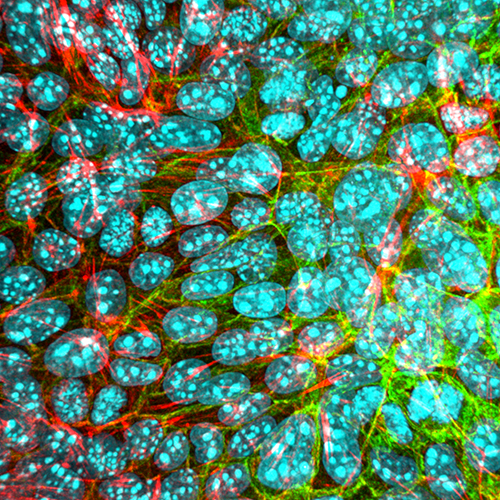Keratinocytes strike a balance in the epidermal barrier

The epidermis actively maintains its integrity as it is exposed to immunological and physical insults by forming a structural and immune barrier. Keratinocytes in the epidermal barrier must therefore balance the processes of immune defense and immune tolerance. This week in the JCI, work led by Stephen Galli at Stanford University has determined that expression of the E3 ubiquitin ligase RAB guanine nucleotide exchange factor 1 (RABGEF1) in keratinocytes plays a crucial role in maintaining epidermal barrier function. Keratinocyte-specific deletion of RABGEF1 induced an allergic, inflamed phenotype in mice that was associated with abnormal activation of the IL-1R/MYD88/NF-kB signaling pathway. The investigators observed similar abnormalities in RABGEF and MYD88 expression in skin samples from humans with allergic contact dermatitis or atopic dermatitis. Together, these findings indicate that RABGEF1 in keratinocytes targets MYD88 to maintain homeostasis in the epidermal barrier, suggesting that this pathway may be a potential target for treating allergic skin disorders.
In the accompanying image, fluorescent staining illustrates the structure of the epidermal barrier, showing the arrangement of keratinocytes (DAPI nuclei, cyan), actin (red) and E-cadherin (green).
Related articles
Abstract
Epidermal keratinocytes form a structural and immune barrier that is essential for skin homeostasis. However, the mechanisms that regulate epidermal barrier function are incompletely understood. Here we have found that keratinocyte-specific deletion of the gene encoding RAB guanine nucleotide exchange factor 1 (RABGEF1, also known as RABEX-5) severely impairs epidermal barrier function in mice and induces an allergic cutaneous and systemic phenotype. RABGEF1-deficient keratinocytes exhibited aberrant activation of the intrinsic IL-1R/MYD88/NF-κB signaling pathway and MYD88-dependent abnormalities in expression of structural proteins that contribute to skin barrier function. Moreover, ablation of MYD88 signaling in RABGEF1-deficient keratinocytes or deletion of
Authors
Thomas Marichal, Nicolas Gaudenzio, Sophie El Abbas, Riccardo Sibilano, Oliwia Zurek, Philipp Starkl, Laurent L. Reber, Dimitri Pirottin, Jinah Kim, Pierre Chambon, Axel Roers, Nadine Antoine, Yuko Kawakami, Toshiaki Kawakami, Fabrice Bureau, See-Ying Tam, Mindy Tsai, Stephen J. Galli



Copyright © 2025 American Society for Clinical Investigation
ISSN: 0021-9738 (print), 1558-8238 (online)

